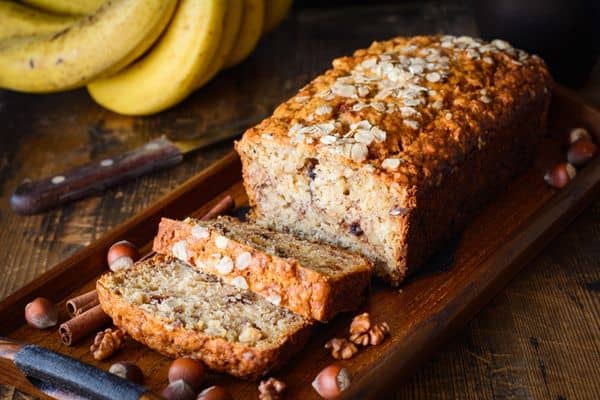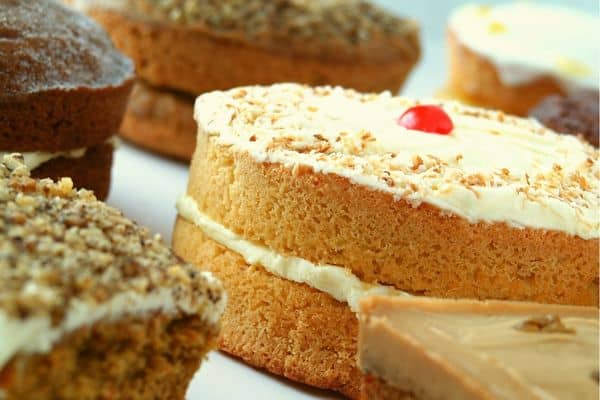Baking Powder vs Baking Soda – you must have used them in your baking either as a beginner or a pro baker!
These two similar-looking leaveners are essential for baking, and this makes us more confused about choosing one.
Whether it’s about baking cookies or cake, we often need help deciding when to use baking soda vs baking powder. Well, this confusion sometimes leads to food disasters.
But here are few tips that you can use to figure out which one is baking soda and which one is baking powder without tasting them. One way is to add a little bit of each to a tablespoon of vinegar and see which one reacts.
Baking soda will create a fizzy reaction, while baking powder will not. Another way is to mix a small amount of each with some water. If the mixture bubbles, its baking soda and if it doesn’t, it’s baking powder.
But more is needed to find out which is better for baking. In this comprehensive guide, we’ll compare baking powder and baking soda.
You’ll learn about the differences between these two crucial ingredients for baking.
What Is Baking Soda?
Baking soda is sodium bicarbonate, an alkaline salt. It contains one sodium atom and one bicarbonate ion, which is why it’s also known as sodium bicarbonate.
Though baking soda has various uses, but the most popular one is as a leavening agent in baking.
Baking soda includes a high pH level, which means it is alkaline. When combined with an acidic ingredient in a recipe, it releases carbon dioxide gas.
This gas creates bubbles in the batter or dough, which inflates and helps baked goods rise.
What does Baking Soda do in Baking?
People often ask what does baking soda do?
Well, it is a critical ingredient in baking. When combined with an acid, baking soda acts as a leavening agent, causing the batter to rise. This makes it an essential element in baking, as it creates a light and airy texture.
Baking soda also has several other benefits when it comes to baking. For instance, it can help to prevent baked goods from becoming too brown or burned. It also makes the baked goods more moist and flavorful.
Additionally, baking soda is an excellent thickener for sauces and stews. It makes it easier to digest by breaking down foods.
But Baking soda isn’t the only leavening agent here; baking powder is still in the line.
What Is Baking Powder?
It is a dry chemical leavening agent. It is a combination of cream of tartar, sodium bicarbonate (baking soda), and cornstarch.
When added to wet ingredients, it reacts with the acids in the batter to create carbon dioxide gas. This gas helps the batter rise and makes baked goods lighter and fluffy.
So this was all about the basic…now move towards knowing their role in baking.
Baking soda isn’t the only leavening agent here; baking powder is still in the line.
What does Baking Powder do in Baking?
Most people are familiar with baking powder as an ingredient in baking, but only some know how it works.
Different types of baking powder are available, depending on the acid used. For example, some baking powders use sodium aluminum sulfate, while others use sodium acid pyrophosphate.
- Single-Acting Baking Powder- Single-acting baking powder only starts to produce the carbon dioxide gas when heated, so it’s essential to add it to the batter and then bake the goods right away.
- Double-Acting Baking Powder- Baking powder, on the other hand, reacts as soon as it’s mixed with liquid but produces most of the carbon dioxide when it’s heated. This means you can add it to the batter ahead of time, and it will still work when you bake it.
So, next time you’re baking, remember to add baking powder to the recipe to help the goods bake well.
Though both leaveners have mostly the same effects, there are a few differences between Baking Soda and Baking Powder.
Differences Between Baking Powder and Baking Soda
The differences between baking powder and baking soda are minor, but they can significantly impact your baked goods. Let’s take a closer look:
#1. Acid Content
Baking soda is a leavening agent used to help baked goods rise. It is a single ingredient that contains no added chemicals or acids.
Baking powder can be more effective at helping baked goods rise because it contains a base and an acid. However, it can also make them dense and crumbly.
#2. Alkaline Content
Baking soda is alkaline, while baking powder is acidic. This difference in pH levels is crucial because it helps foods to get fluffy.
The baking soda’s alkaline reacts with the other ingredients’ acids, creating carbon dioxide gas to help the batter rise and make baked goods soft.
On the other side baking powder contains both alkaline and acidic content thus it needs moisture and heat to react.
#3. Safety First
As mentioned, Baking soda is a pure chemical compound—sodium bicarbonate. It has a high pH level. This makes it great for cleaning and degreasing, but it can also be harsh on the skin.
Baking powder, on the other hand, is less alkaline than baking soda and has a lower pH level, which makes it safer for the skin while baking something.
#4. Recipes Matter
Baking powder is also slower to react than baking soda, so it’s ideal for recipes that require a longer rise time, like a light and airy cake.
Baking soda is better for recipes that need a quick rise time, such as biscuits or scones.
#5. Over-Moisture kills the Taste
Another key difference is that baking soda is activated by moisture, while baking powder is activated by heat.
So be careful when using baking soda in recipes, as too much humidity can cause it to over-activate and produce a bitter taste. On the other hand, baking powder is not as affected by moisture.
These differences can help us choose the perfect leavening agent between baking soda vs baking powder. But many people often ask about the consequences of using baking soda and baking powder in a recipe.
What will happen if I Use Both Baking Powder and Baking Soda Together?
If you use baking powder and baking soda together, you’ll end up with a double-acting baking powder, which means that the baked goods will rise twice: once when the batter is first mixed and again when it’s heated.
Baking powder has acidic salt activated by moisture, so it starts working as soon as the batter is mixed.
Baking Soda, on the other hand, is activated by heat, so it doesn’t start working until the batter is heated. When used together, they can produce even better results than when used separately.
This can be especially helpful in recipes that contain little or no acid, such as cookies or cakes made with chocolate.
But suppose you’re in a pinch and don’t have one of the ingredients on hand; what will you do? That’s a million-dollar question.
Is it Possible to Use These Leaveners as Each Other’s Substitute?
Baking powder and baking soda have different chemical compositions and perform differently in recipes.
Baking soda contains no acidic ingredients, so it can’t leaven dough independently. If a recipe doesn’t call for an acidic ingredient like lemon juice or vinegar, you can use baking powder as a one-for-one replacement for baking soda.
But if there is an acidic component in the recipe, you’ll need to use baking soda because it will neutralize the acidity.
On the other hand, you can use baking soda as a baking powder substitute, but you will need to add an acidic ingredient to the recipe for the baking soda to work as a leavening agent.
Also, remember to use more baking soda and less liquid.
Remember that making a substitution might change the taste or texture of the baked goods, so it’s always best to follow a recipe to the letter if you can.
We often can’t decide between baking powder and baking soda regarding specific recipes.
#1. Baking Soda vs Baking Powder to Prepare Banana Bread

So, let’s say you’re making banana bread. Which one should you choose between baking soda vs baking powder banana bread?
The answer lies in the ingredients. Baking soda contains sodium bicarbonate. When mixed with an acidic component like sour cream, yogurt, or buttermilk, it helps to leaven the bread.
Baking powder, on the other hand, includes sodium bicarbonate and an acidic ingredient (usually cream of tartar). It’s a combination of the two components that we need for banana bread.
Baking powder usually gives the bread a lighter texture. But if you’re looking for a denser loaf of banana bread, go with baking soda.
No coming to cakes – the best way to celebrate your success or any festivities!
#2. Baking Soda vs Baking Powder in the Cake

While baking a cake, I often need clarification and ask myself, can I use baking soda instead of baking powder for cake? Read carefully to understand the answer.
When baking powder is used in a cake batter, there’s no need to add acid to the recipe – the baking powder will provide both the leavening power and the acidity.
But it is a weaker leavening agent than baking soda, so it will not add as much lift to the cake. However, it can make the cake more moist and tender.
Baking soda, on the other hand, needs an acidic ingredient like sour cream or buttermilk to work its leavening magic. As a more potent leavening agent than baking powder, it can give the cake a little extra lift and make it slightly dense.
So, both leaveners can be added to the cake per the individual’s choice.
Apart from cake and bread, it’s salient to find out which one to use—baking powder vs baking soda in cookies.
#3. Baking Powder vs Baking Soda in Cookies

So, which should you use in your cookies? Baking powder, baking soda, or both?
When used in cookie dough, the baking powder helps to create a light texture. However, too much baking powder can make a tough and dry cookie. Therefore, it’s essential to use the right amount when adding it to your dough.
On the other hand, Baking soda helps quick bread and cakes rise. We can also use it as a cookie dough conditioner. When used in cookies, it helps to make them crispier.
Baking powder and baking soda can be used in cookies, but the amount will depend on the recipe. If a recipe calls for baking powder and soda, the baker wants the cookies to be extra light and fluffy.
Now, what are you waiting for?
Go to a nearby store, grab a packet of your favorite leavener and start baking some delicious foods.
Baking Powder vs Baking Soda – Clear the Difference!
There’s nothing worse than getting ready to bake a batch of cookies only to realize that the baking powder or baking soda is expired.
But the good news is that these ingredients don’t actually go bad. Over time, they may lose some potency, but they’ll still work fine in the recipes.
To make sure the baking soda and baking powder are fresh here is my tip to follow. Add a pinch of baking powder to boiling water and watch if it creates bubbles.
Also, don’t stress if you can’t remember when you bought that can of baking powder. As long as it still works, it’s fine to use. Just be sure to stock up on fresh ingredients to always bake your best!